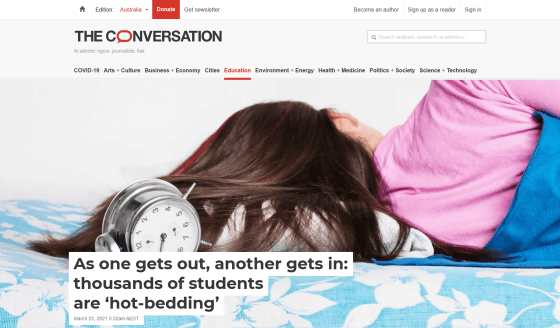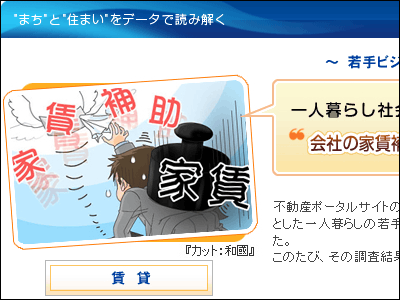Australian Survey Finds Many International Students 'Share Beds with Others'

Some students who can't afford it are floating their rent by sharing a room with people in the same situation, but a survey of Australian students found that not only bedrooms but also 'beds'. It turns out that some international students share the same. These people, who share a bed with multiple people, live in a situation where they cannot sleep during the time when others are sleeping.
international-students-and-housing-survey-report-final-report.pdf
(PDF file)
As one gets out, another gets in: thousands of students are'hot-bedding'
https://theconversation.com/as-one-gets-out-another-gets-in-thousands-of-students-are-hot-bedding-156589

It is known that international students attending schools in developed countries often suffer from financial problems, and it is not uncommon for international students to share rooms. According to a survey conducted by an Australian research team on more than 7,000 international students living in Sydney and Melbourne before the pandemic of the new coronavirus infection (COVID-19), 218 people, or 3% of the total, said they were 'self'. You can only use your bed for a few hours day or night. '
Fifty-five percent of international students sharing beds were male, 45% were female, and 65% attended vocational or non-English language colleges. In addition, less than one-third of international students sharing beds are in low-income countries, about half are in middle-income countries, 15% are studying abroad in Australia from high-income countries, and more than 60% are 19 to 25 years old. On the other hand, 11% of international students over 30 years old were included.
Interestingly, international students who share a bed do not necessarily think that the rent is too high, with 23% disagreeing with the item 'I think the rent I pay is fair'. I stayed. On the other hand, 51% of international students who share a bed are worried about paying weekly rent, which is clearly higher than 35% of international students who do not share a bed. I will.
If the international students surveyed live within 40 minutes of the educational institution they attend, 58% pay a weekly rent of $ 250 or more. Forty percent of international students who share a bed said they didn't buy food or other living items to pay the rent, and the same percentage of international students said they couldn't pay the rent because they didn't have the money. It is also clear that there are difficulties in paying rent, such as answering 'There is.' Forty-eight percent of international students sharing beds said that anxiety about rent payments had a negative impact on their studies.

The living environment where you have to share a bed with others seems to be tough, but 78% of international students who share a bed say they are happy with the house they rent. 72% agreed with the item 'The house I rent meets my needs', and about 10% of the respondents were dissatisfied with the poor maintenance of the property.
On the other hand, 27% of international students who share a bed and 12% of international students who do not share a bed feel that the house they live in is small. In addition, 23% of international students who share a bed use balconies and garages as bedrooms, and 35% agree that the condition of their place of residence adversely affects their research. The percentage of international students who did not share a bed agreed with this item was 13%.
Most international students who share a bed say they have good relationships with landlords and realtors, but just under one-third said they could be asked to move out if they complained about property standards and maintenance. I agreed with the item 'Yes' and was worried about the stability of the house.
Also, when asked 'Did you feel that you could be homeless in the last year?', 37% of international students who share a bed answered 'yes' and did not share a bed. It is more than double the 17% of international students. A little less than 40% of international students who share a bed agree that 'stress about the possibility of losing a home is affecting academic research', and housing instability may have a negative impact on academics. Gender is shown.

Forty-eight percent of international students who share a bed work to make money, which is significantly higher than 17% of international students who do not share a bed. On the other hand, the majority of working students have low wages and employment patterns are unstable. Less than half of the international students who share a bed feel that they are well paid, and three-quarters feel that their current job is unsafe. ..
The graph below

According to the research team, about 10% of international students who share a bed answered 'yes' to all eight questions, and 34% answered 'yes' to five or more. On the other hand, only 9% of international students answered 'yes' to 5 or more questions and did not share a bed, and less than 1% answered 'yes' to all 8 questions. From this point as well, it is known that international students who share a bed are exposed to strong financial stress.
Related Posts:
in Note, Posted by log1h_ik







